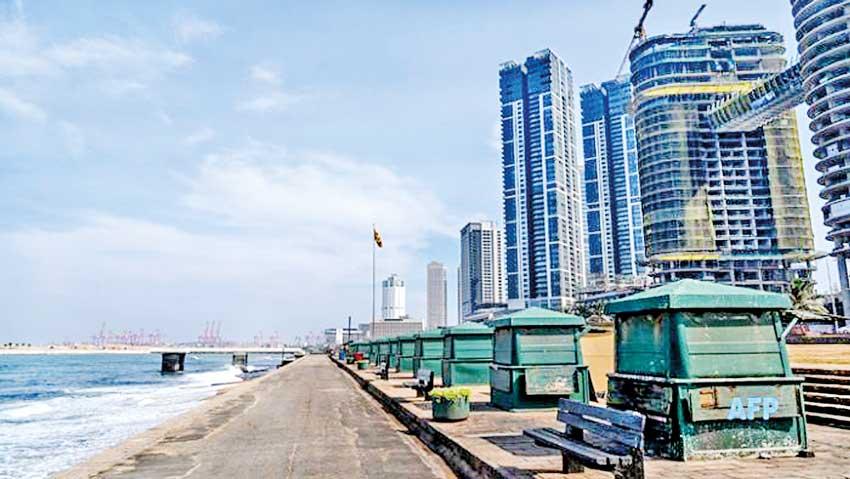18 May 2020 - {{hitsCtrl.values.hits}}

Sri Lanka’s post-COVID-19 economic recovery policies must prioritise mitigating the hardship on masses, restoring economic stability and improving the investment climate for business with pragmatic policies instead of giving into vested interests and ideological biases, as the country is more likely to experience a ‘U-shaped’ recovery with a period of flat growth, according to a latest report.
An eminent study group convened by the Pathfinder Foundation last Saturday presented the report titled ‘Pathfinder Beyond the Box: A New Economic Vision for Post-Covid-19 Sri Lanka’ to President Gotabaya Rajapaksa.
The study group, which comprised of representatives of academia/research houses as well as key figures from the business community led by Former Central Bank Governor and Pathfinder Foundation Senior Fellow, Dr. Indrajit Coomaraswamy, proposed a mix of macroeconomic, structural, pro-poor and climate-friendly economic policies to build the post-COVID-19 Sri Lankan economy.
The report highlighted that the country’s economy is unlikely to make a quick recovery within next year considering many domestic as well as international risks and uncertainties.
“A more likely outcome seems a U-shaped recovery with a period of flat growth,” the report predicted.
According to the International Monetary Fund (IMF) and the World Bank, Sri Lanka’s economy is set to enter into a period of recession this year.
Therefore, it was urged that the government’s top priority on the economic front should be to lessen the hardship on the people as much as possible with pragmatic policies and careful execution of such policies.
“The sharp economic downturn coupled with a slow recovery implies a growing risk of mass unemployment and rising poverty in Sri Lanka. This would cause misery to the population and have devastating social consequences. Domestically, there could also be significant financial strains from the over-stretched public health system and payments to the poor and vulnerable,” the authors of the report pointed out.
As the twin deficit economy was severely impacted by the pandemic further constraining the fiscal space and the capacity to respond to the crisis, the report emphasised that the second priority must be attached to building fiscal and external reserve buffers to increase resilience by de-risking the economy going forward.
In this regard, it was urged to draw funds from both domestic and external sources to build buffers and to have a sizable fiscal response to address the crisis.
“At this perilous juncture, the authorities need “to go big” in terms of borrowing domestically (including from CBSL) and from official development partners to overcome the lack of fiscal space. Such borrowing should be strictly allocated to social protection and productive investment,” it stressed.
In particular, the government was encouraged to make use of the current favourable environment to enter into a programme with the IMF as it has given greater priority to growth, employment and social protection instead of stabilisation/austerity during the COVID-19 crises.
Further, the Ministry of the Finance and the Central Bank were urged to issue a clear statement about frameworks for formulating consistent and predictable macroeconomic policies to avert possible scenarios leading to macroeconomic instability and policy uncertainty.
The report underscores that such measures are crucial as the effects of the global output collapse are being transmitted to Sri Lanka through falling demand for exports, capital outflows, falling remittances, a halt in tourism and a loss of business confidence, while high external debt payments denominated in US dollars amid dwindling reserves further complicate the external economic landscape in the country.
Thirdly, the report recommended the government to take urgent measure to grant concessional loans guaranteed by the government/CBSL based on credit lines from international financial institutions to facilitate the private sector firms restructure businesses to reap new opportunities and to create jobs.
“Given the binding fiscal constraints related to the solvency of the country and the current constitutional limitations,which constrain fiscal space, it is recommended that these firms are granted concessional loans guaranteed by the government/CBSL based on credit lines from the international financial institutions,” the report read.
As the COVID-19 pandemic has led to the closure of a large swathe of the economy, causing an unprecedented impact on economic activity resulting in widespread disruption of livelihoods as well as businesses, it was emphasized such relief is required to avoid large scale job losses.
The study group also called the government to adopt a refined strategy, which is pragmatic and non-ideological in nature while drawing lessons from past experiences.
“It should draw lessons from the low growth, muted investment, high unemployment and black-market prices associated with the inward-looking policies of the 1970-77 era as well as the increased vulnerability to external economic shocks, climate risks, increased inequality, reduced social protection and pandemics of the period since the opening up of the economy in 1977,” the report stated.
It also noted that careful consideration should be given on resetting the role of the State in the new normal of the post-COVID-19 world while acknowledging the important role of the State in responding to such crises.
“It should be calibrated in such a way that inefficiency and corruption are minimized and the role of the private sector as the primary engine of growth and wealth creation is not stifled.”
In order to assess the economic damage caused by the COVID-19 pandemic and to develop an actionable national economic strategy, the report suggested a Presidential Task Force assisted by a multidisciplinary advisory group of experts, who could provide technical advice and support with monitoring outcomes.
In addition, the report also proposed to setup a committee of secretaries of development ministries, chaired by the Secretary to the President, to improve consistency and predictability of policy making as well as priority-setting and co-ordination for implementation.
17 Nov 2024 31 minute ago
17 Nov 2024 34 minute ago
17 Nov 2024 2 hours ago
17 Nov 2024 4 hours ago
17 Nov 2024 4 hours ago